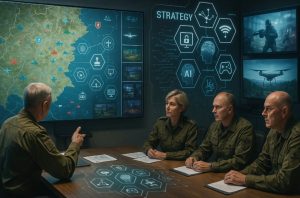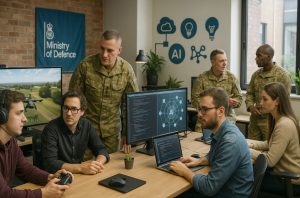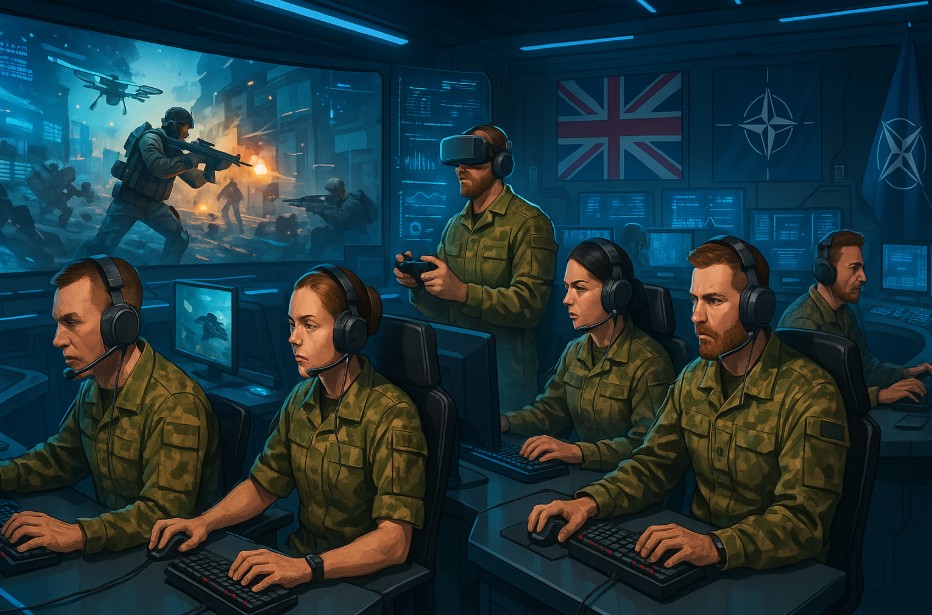How Will a New UK Esports Collaboration Boost Cyber and Digital Defence Skills?
What happens when the worlds of esports and defence intersect? Can a video game controller become as vital as traditional weaponry in preparing military personnel for 21st-century warfare? The UK government is betting that it can and has launched a bold initiative to prove it.
In a strategic move to enhance national defence readiness, the Ministry of Defence (MOD) has partnered with British Esports to create a world-first collaboration that combines the immersive world of gaming with advanced military training. This initiative aims to improve the digital, cyber, and AI capabilities of the UK Armed Forces while also nurturing wider tech talent across the defence sector.
What Is the UK’s New Defence Esports Partnership?

On 29 July 2025, the Ministry of Defence formally announced a collaboration with British Esports to establish the International Defence Esports Games (IDEG).
This tournament, the first of its kind, will be delivered through UK Strategic Command, which is transitioning to become Cyber and Specialist Operations Command.
The tournament is initially open to regular and reservist military personnel but will expand to include cadets, veterans, civil servants, and employees within the defence industry.
This move is part of the MOD’s broader effort to foster a culture of digital excellence across all levels of defence.
Backed by government funding and industry leaders like BAE Systems, the initiative signals a significant shift in how the MOD envisions defence training and recruitment in a digital age.
Why Is Esports Being Used to Train Cyber and Drone Specialists?
The battlefield is evolving and so are the skills required to succeed on it. The UK military is now integrating serious gaming into training, building on lessons learned from Ukraine, where simulator-based gaming has helped develop effective drone operators and cyber defence teams.
Traditional warfare increasingly intersects with digital environments. That means military personnel need to be as fluent in coding, cyber protocols, and AI systems as they are with firearms and field tactics.
Esports provides a low-barrier, high-engagement environment for honing exactly these skills.
The MOD believes that the competitive nature of esports fosters crucial capabilities such as:
- Hand-eye coordination
- Tactical decision-making under pressure
- Strategic thinking in virtual and real-time scenarios
These attributes align with the growing demand for cyber operatives and drone pilots capable of navigating complex, data-driven warfare landscapes.
How Does Esports Fit Into the UK’s Broader Defence Strategy?

The UK’s Strategic Defence Review prioritises digital transformation across the military. The esports initiative complements this by introducing new ways to upskill personnel and identify digital talent from both within and beyond the armed forces.
Lieutenant General Sir Tom Copinger-Symes, Deputy Commander of UK Strategic Command, noted that esports can train teams to operate in high-stakes environments and simulate real-time decision-making.
He compared it to traditional sports like football and rugby, long used to build resilience and cohesion among troops.
Here, however, the goals are not only fitness and morale, but also digital fluency, readiness for AI-based warfare, and cybersecurity defence.
When and Where Will the First International Defence Esports Games Be Held?
The first IDEG finals are scheduled to take place in the UK in late 2026, organised in partnership with British Esports and a leading esports production company.
This will be more than a showcase of gaming talent it will be a demonstration of international defence cooperation through digital sport.
The tournament aims to draw participants from allied nations, breaking traditional training silos and creating a new platform for collaboration.
It also serves to highlight the MOD’s increasing openness to innovation and new talent pipelines, particularly from the UK’s growing esports, gaming, and cybersecurity startup ecosystems.
What Other Developments Support This New Direction?
The MOD’s commitment to digital transformation does not stop at gaming. Several other key initiatives are in motion, including the Cyber Direct Entry Scheme, which offers a fast-track recruitment route for tech-savvy individuals.
Here’s a quick comparison of traditional vs cyber recruitment:
| Recruitment Path | Basic Training Duration | Specialist Training Focus |
| Traditional Military Entry | ~10 weeks | Physical training and combat |
| Cyber Direct Entry Scheme | ~4 weeks | 3 months in digital/cyber skills |
This scheme shortens the general training period while extending focused instruction in areas like cybersecurity, network defence, and AI application.
It allows individuals with digital skills to join the military with a quicker, tailored route ideal for candidates with backgrounds in tech, gaming, or engineering.
Additionally, the Royal Navy recently partnered with British Esports to launch an esports facility aboard HMS Prince of Wales, featuring elite gaming equipment from companies like Alienware, NVIDIA, and Intel. It signals that esports is now an embedded part of military culture and innovation.
What Does This Mean for the UK’s Startup and Tech Communities?

The UK startup ecosystem particularly in gaming, AI, cyber defence, and digital training has a unique opportunity to engage with this new MOD-backed initiative.
With growing demand for:
- Drone simulation platforms
- Cybersecurity training modules
- Real-time AI decision systems
- Esports tournament production
- Team-based digital learning tools
Startups now have a path into defence collaboration through innovation rather than traditional procurement.
There is clear potential for co-developing systems, tools, and experiences that meet modern defence needs while driving the growth of the UK’s tech sector.
British Esports President Chester King summed up the opportunity:
“Military esports has been steadily growing… This tournament marks a shift in how games are used to support welfare, skills, and strategy across defence.”
Could Esports Shape the Future of Military Recruitment?
Absolutely. As digital threats grow and AI-driven warfare becomes more mainstream, the need for cyber-competent, digitally fluent personnel will only intensify.
Esports offers a dynamic way to attract younger talent who already possess high levels of digital literacy.
By integrating gaming into both training and outreach, the MOD is not only future-proofing its workforce but also opening new routes for startups and innovators to support national security efforts.
This new intersection of play, training, and digital defence may just be one of the most transformative shifts in UK military history.
FAQ
What is the International Defence Esports Games (IDEG)?
IDEG is a new MOD-backed global esports tournament aimed at improving cyber, AI, and digital skills among UK and allied military personnel.
Who can participate in IDEG?
Initially open to serving personnel and reservists, IDEG will expand to include cadets, veterans, civil servants, and defence industry staff.
How does esports help with military training?
Esports enhances hand-eye coordination, teamwork, decision-making, and strategic thinking—skills crucial for cyber and drone operations.
When will the first IDEG finals take place?
The inaugural IDEG finals are scheduled for late 2026 and will be hosted in the UK.
What is the Cyber Direct Entry Scheme?
It’s a fast-track MOD recruitment route for aspiring cyber professionals, with shortened basic training and three months of specialist digital instruction.
How can UK startups benefit from this initiative?
Startups in gaming, AI, and cyber tech can collaborate with MOD and British Esports to develop tools and platforms for defence training and recruitment.







